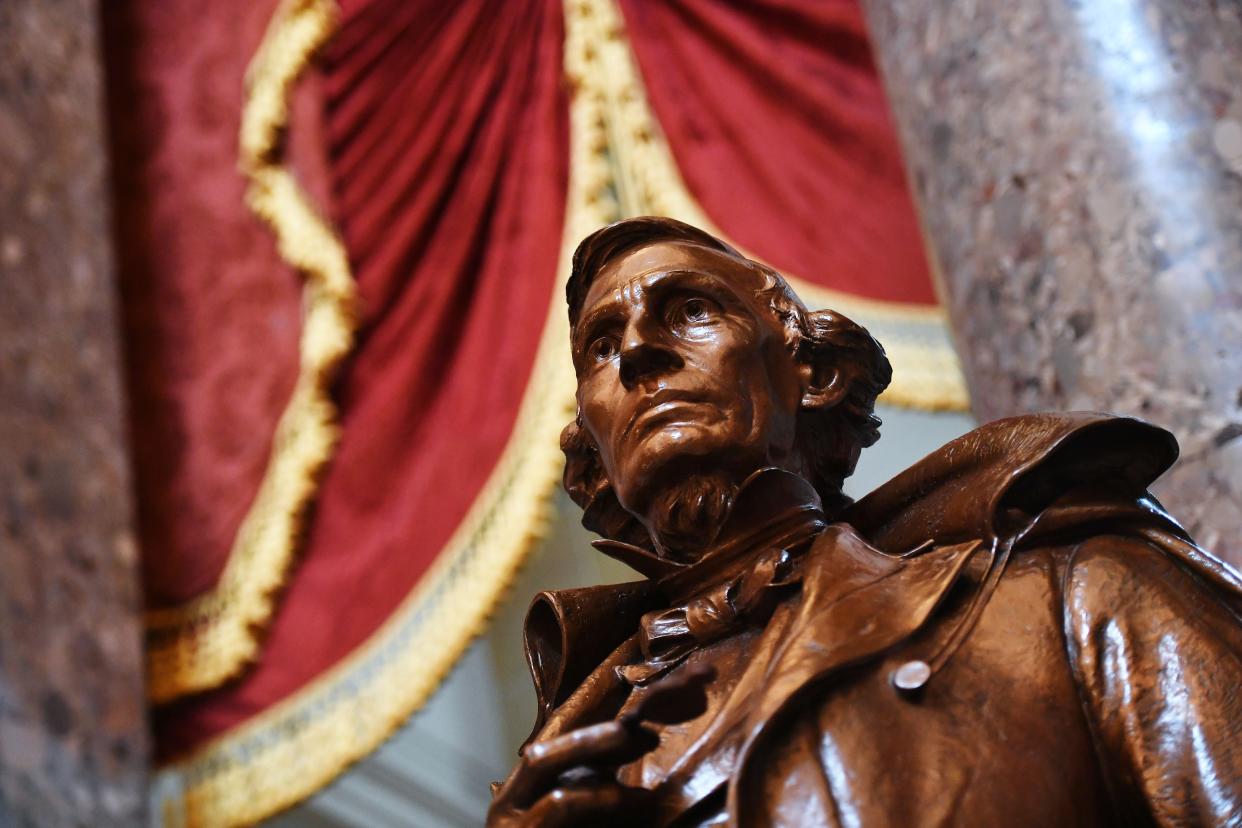House to vote for removal of Confederate statues from Capitol

- Oops!Something went wrong.Please try again later.
- Oops!Something went wrong.Please try again later.
The House of Representatives is expected to vote to remove statues of Confederate figures from the US Capitol, as well as the bust of a former US Supreme Court justice who issued the high court’s decision that defended the enslavement of African Americans.
Lawmakers have proposed replacing a bust of Robert Taney with a bust of Thurgood Marshall, the court’s first Black justice.
Last year, the House advanced a similar bill by a vote of 305 to 113, but it stalled in a then Republican-controlled Senate. It faces a similar roadblock in the evenly divided Senate but is expected to pass the House on 29 June.
In a statement reintroducing the bill, House Majority Whip James Clyburn said that while members of a mob that stormed the halls of Congress waved Confederate flags on 6 January, “there are still vestiges that remain in this sacred building that glorify people and a movement that embraced that flag and sought to divide and destroy our great country.”
“This legislation will remove these commemorations from places of honor and demonstrate that as Americans we do not celebrate those who seek to divide us,” he said.
In his 1857 ruling in the landmark Dred Scott v Sandford case, Justice Taney wrote that Black people – whether they were free or born into enslavement – were not considered American citizens, and argued that people of African descent “had for more than a century before been regarded as beings of an inferior order and altogether unfit to associate with the white race, either in social or political relations”.
He held that they “had no rights which the white man was bound to respect; and that the Negro might justly and lawfully be reduced to slavery for his benefit”.
The ruling was later voided by ratification of the US Constitution’s 13th Amendment, which abolished slavery except as punishment for a crime, and the 14th Amendment, which guarantees citizenship for people born in the US or under its jurisdiction.
House Majority Leader Steny Hoyer, whose home state of Maryland removed a statue of Justice Taney from the state house, said the Dred Scott ruling “was a blot on our history and represents the tragic legacy of slavery and racism that should not be celebrated in our country”.
Demonstrators and state and local officials across the US have sought to take down and replace monuments to the Confederacy that dot the nation’s cities and state houses, following the removals of four Jim Crow-era statues to Confederate leaders and white supremacists erected in the aftermath of Reconstruction and violent segregation in New Orleans, and as racial justice uprisings in 2020 have forced state and local officials to reckon with legacies of racist violence.
Last year, House Speaker Nancy Pelosi called for the removal of 11 Confederate monuments at the Capitol, arguing that “monuments to men who advocated cruelty and barbarism to achieve such a plainly racist end are a grotesque affront to these ideals”.
“Their statues pay homage to hate, not heritage,” she wrote to the Joint Committee on the Library. “They must be removed.”
Congressman Clyburn’s legislation directs the Capitol architect to remove statues of “individuals who voluntarily served the Confederate States of America” – including its president, Jefferson Davis, and vice president, Alexander Stephens, whose statues are prominently installed in the Capitol’s Statuary Hall.
It also specifically names statues of three men: Charles Aycock, John Calhoun and James Paul Clarke, avowed white supremacists who defended slavery and the disenfranchisement of Black voters.
Read More
US judge: Rep. Boebert can block people on personal Twitter
Philippine democracy scion, ex-leader Benigno Aquino dies
Trump seems to shrug off right-wing fever dream of him becoming speaker of the House

